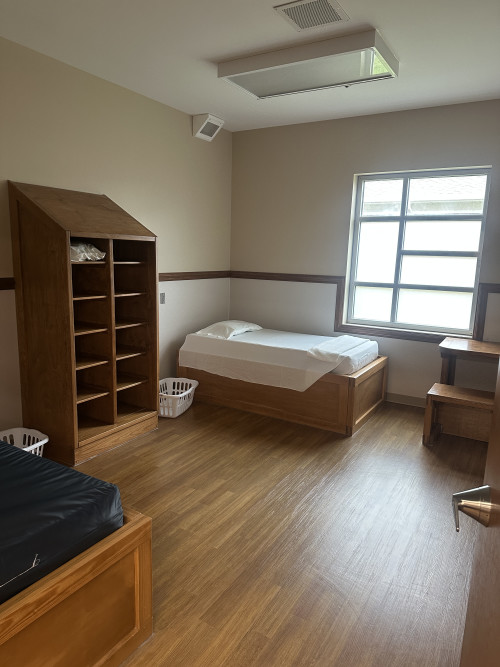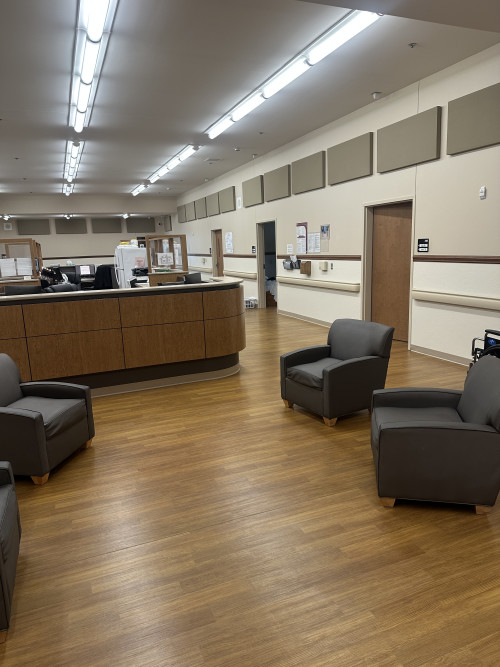






Willow Creek Behavioral Health
Treatment Focus
This center treats substance use disorders and mental health conditions. You'll receive individualized care catered to your unique situation and diagnosis, learn practical skills for recovery, and make new connections in a restorative environment.
Primary Level of Care
Provides 24/7 medical supervision and intensive treatment in a clinical setting for individuals in crisis or with acute needs, focusing on stabilization and immediate safety
Claimed
Recovery.com has connected directly with this treatment provider to validate the information in their profile.
Treatment Focus
This center treats substance use disorders and mental health conditions. You'll receive individualized care catered to your unique situation and diagnosis, learn practical skills for recovery, and make new connections in a restorative environment.
Primary Level of Care
Provides 24/7 medical supervision and intensive treatment in a clinical setting for individuals in crisis or with acute needs, focusing on stabilization and immediate safety
Provider's Policy
We accept most private insurances, Medicare, and Medicaid. We offer payment plans and financial assistance may be available. Coverage may vary by condition or substance. Please contact our dedicated team and let us help you find the best option. Clients are welcome to pay online on our site.
Willow Creek Behavioral Health
Willow Creek Behavioral Health
About Willow Creek Behavioral Health
Set in the suburban area on the east side of Green Bay, Willow Creek Behavioral Health treats a wide range of mental health conditions or alcohol or drug addiction treatment, as well as dual-diagnosis treatment. Willow Creek's levels of care are inpatient care, day (PHP) treatment, and intensive outpatient (IOP) treatment. (Willow Creek also refers to their IOP as "part-time outpatient care".) For co-occurring drug addiction, they do on-site detox with 24/7 monitoring and medication-assisted treatment.
Experienced Medical Team
Their treatment team includes psychiatrists, psychologists, medical doctors, nursing staff, therapists, and behavioral health associates. They take and evidence-based and trauma-informed approach that includes talking to a counselor, occupational therapy, recreational therapy, and mindfulness. Their staff is able to prescribe medicines for mental health or addiction and help clients manage their med lists. They don't prescribe buprenorphine-based medications, but if a client already has a prescription for those, they can administer the medication on-site to ensure a safe, coordinated detox.
Immediate, Age-Appropriate Services
Clients can come to Willow Creek for prompt service, including walk-ins for crisis care. Willow Creek's inpatient program serves clients 5+ with age-appropriate therapies for children, teens, adults, and older adults. Their older adult program includes extra caregiver education to strengthen family bonds and ensure long-term success after clients leave. Their outpatient programs serve adults.
The adult day program meets weekdays from 8:30 a.m. to 2:50 p.m. for about 3 weeks. Their adult IOP meets weekdays from either 8:30 to 11:30 a.m. or 5:30 to 8:30 p.m., giving clients options to work IOP into their normal routine and continue as long as needed. Clients can come in-person or virtually.
Holistic Healing through Art, Gardening, and Yoga
Some optional whole-person therapies at Willow Creek are their art, gardening, and yoga. Willow Creek runs their gardening course until late fall with the goal of helping clients connect with nature and "get back to their roots." Their yoga program complements other meditative and mindfulness therapies. The staff can adjust their approach to yoga based on clients' comfort level.
The goal of the holistic therapies is to create a balanced environment to nurture the mind and body. Willow Creek laid out their campus to aid in this, with semi-private rooms to promote connections, 3 open air courtyards, a gym, and a dedicated classroom space.
Large Meal Variety
Willow Creek provides many types of food to cater to clientele, including tacos, hamburgers, fish, brats, salad bars, eggs, bacon, toast, French toast, biscuits & gravy, juice, milk, and sweet desserts. There are also soda and coffee machines. Clients enjoy the same meals that the staff do.
Center Overview
Treatment Focus
This center treats substance use disorders and mental health conditions. You'll receive individualized care catered to your unique situation and diagnosis, learn practical skills for recovery, and make new connections in a restorative environment.
Joint Commission Accredited
The Joint Commission accreditation is a voluntary, objective process that evaluates and accredits healthcare organizations (like treatment centers) based on performance standards designed to improve quality and safety for patients. To be accredited means the treatment center has been found to meet the Commission's standards for quality and safety in patient care.

Insurance Accepted
Cash Pay Rates
Estimated Cash Pay Rate
Center pricing can vary based on program and length of stay. Contact the center for more information. Recovery.com strives for price transparency so you can make an informed decision.
Levels of Care








Your Care Options
Specializations
Older Adults
Addiction and mental health treatment caters to adults 55+ and the age-specific challenges that can come with recovery, wellness, and overall happiness.
Adolescents
Teens receive the treatment they need for mental health disorders and addiction, with the added support of educational and vocational services.
Children
Treatment for children incorporates the psychiatric care they need and education, often led by on-site teachers to keep children on track with school.
Anxiety
Anxiety is a common mental health condition that can include excessive worry, panic attacks, physical tension, and increased blood pressure.
Depression
Symptoms of depression may include fatigue, a sense of numbness, and loss of interest in activities. This condition can range from mild to severe.
Who We Treat
Older Adults
Addiction and mental health treatment caters to adults 55+ and the age-specific challenges that can come with recovery, wellness, and overall happiness.
Adolescents
Teens receive the treatment they need for mental health disorders and addiction, with the added support of educational and vocational services.
Children
Treatment for children incorporates the psychiatric care they need and education, often led by on-site teachers to keep children on track with school.
LGBTQ+
Addiction and mental illnesses in the LGBTQ+ community must be treated with an affirming, safe, and relevant approach, which many centers provide.
Men and Women
Men and women attend treatment for addiction in a co-ed setting, going to therapy groups together to share experiences, struggles, and successes.
Approaches
Evidence-Based
A combination of scientifically rooted therapies and treatments make up evidence-based care, defined by their measured and proven results.
Holistic
A non-medicinal, wellness-focused approach that aims to align the mind, body, and spirit for deep and lasting healing.
Medical
Medical addiction treatment uses approved medications to manage withdrawals and cravings, and to treat contributing mental health conditions.
Therapies
1-on-1 Counseling
Patient and therapist meet 1-on-1 to work through difficult emotions and behavioral challenges in a personal, private setting.
Meditation & Mindfulness
A practiced state of mind that brings patients to the present. It allows them to become fully aware of themselves, their feelings, and the present moment.
Trauma-Specific Therapy
This form of talk therapy addresses any childhood trauma at the root of a patient's current diagnosis.
Online Therapy
Patients can connect with a therapist via videochat, messaging, email, or phone. Remote therapy makes treatment more accessible.
Art Therapy
Visual art invites patients to examine the emotions within their work, focusing on the process of creativity and its gentle therapeutic power.
Family Therapy
Family therapy addresses group dynamics within a family system, with a focus on improving communication and interrupting unhealthy relationship patterns.
Horticultural Therapy
Gardening can be both meditative and inspiring. This therapy encourages social, emotional, and physical recovery.
Medication-Assisted Treatment
Combined with behavioral therapy, prescribed medications can enhance treatment by relieving withdrawal symptoms and focus patients on their recovery.
Psychoeducation
This method combines treatment with education, teaching patients about different paths toward recovery. This empowers them to make more effective decisions.
Conditions We Treat
Schizophrenia
Schizophrenia is a serious mental health condition that causes hallucinations, delusions, and disordered thinking.
Personality Disorders
Personality disorders destabilize the way a person thinks, feels, and behaves. If untreated, they can undermine relationships and lead to severe distress.
ADHD, ADD
ADHD is a common mental health condition caused by dopamine imbalance. Common symptoms include inattention, hyperactivitiy, and impulsivity.
Anger
Although anger itself isn't a disorder, it can get out of hand. If this feeling interferes with your relationships and daily functioning, treatment can help.
Anxiety
Anxiety is a common mental health condition that can include excessive worry, panic attacks, physical tension, and increased blood pressure.
Bipolar
This mental health condition is characterized by extreme mood swings between depression, mania, and remission.
Depression
Symptoms of depression may include fatigue, a sense of numbness, and loss of interest in activities. This condition can range from mild to severe.
Obsessive Compulsive Disorder (OCD)
OCD is characterized by intrusive and distressing thoughts that drive repetitive behaviors. This pattern disrupts daily life and relationships.
Substances We Treat
Alcohol
Using alcohol as a coping mechanism, or drinking excessively throughout the week, signals an alcohol use disorder.
Co-Occurring Disorders
A person with multiple mental health diagnoses, such as addiction and depression, has co-occurring disorders also called dual diagnosis.
Drug Addiction
Drug addiction is the excessive and repetitive use of substances, despite harmful consequences to a person's life, health, and relationships.
Languages
Care Designed for Your Needs
Personal Amenities
Amenities
Special Considerations
Activities
Yoga
Yoga is both a physical and spiritual practice. It includes a flow of movement, breathing techniques, and meditation.
Smoking Policy






